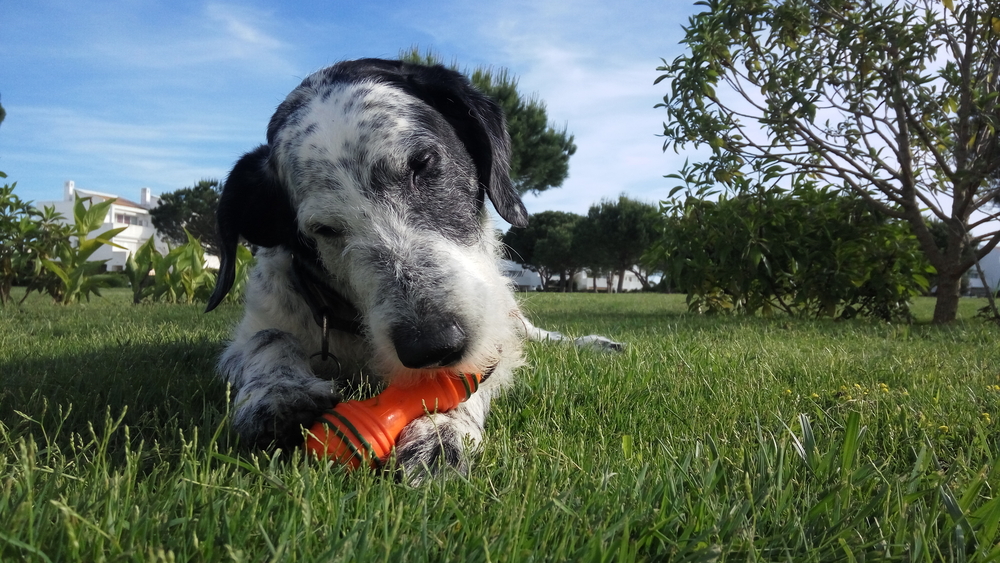When we talk about our furry senior citizens, there’s a heartwarming sense of companionship that has been built over years. Yet, as they step into their golden years, their social needs evolve. Let’s delve into how we can cater to these needs, ensuring their cognitive health and emotional well-being are as robust as their younger selves.
Key Takeaways
- Senior dogs benefit greatly from socialization, which can enhance cognitive function and emotional health.
- Understanding a senior dog’s body language is key to recognizing their social needs.
- Creating social opportunities tailored to an older dog’s pace and preferences is essential.
- Adjusting our expectations and being patient with changes in our senior dogs’ behavior is important for meaningful interactions.
- Consistent routines that combine socialization with exercise can improve a senior dog’s quality of life.
“Games to Play with Your Senior Dog …” from www.fearfreehappyhomes.com and used with no modifications.
Have Fun Socializing Your Senior Dog
As dogs age, they may not romp around with the gusto of a puppy, but their need for social interaction remains. Socializing your senior dog is not just about keeping them physically active; it’s about nurturing their mind and soul. It’s a common misconception that older dogs don’t need or want to socialize. In truth, they thrive on it, and here’s why.
Older Dogs Need Friends Too
Just like us, dogs are social creatures. Their entire lives revolve around being part of a pack, and this doesn’t change as they age. Companionship can prevent feelings of loneliness and isolation, which are as detrimental to dogs as they are to humans. Social interactions can stimulate their minds, keep depression at bay, and even help maintain cognitive functions as they age. I know Lovie misses his buddies, many of whom he has been friends with since he was only 4 months old. Unfortunately, one of the hard parts of getting older for dogs just like people is that it is lonely being the last one standing if you outlive your pals.
It Is So Fun Bonding With Your Senior Rescue
Besides the obvious benefits to your senior dog, you’ll find that engaging them in social activities can strengthen your bond. It’s a chance to understand and appreciate their evolving needs and personalities. Plus, watching your senior dog make new friends or enjoy a serene moment with a long-time furry companion can be incredibly rewarding.
Is Your Senior Dog Rescue A Social Butterfly?
Each dog has a unique personality, and this doesn’t fade with age. Some senior dogs may become more mellow, while others maintain a zest for interaction. Recognizing their readiness for socialization is crucial in providing the right opportunities for them.
Read Their Body Language
Senior dogs often communicate their comfort or discomfort through body language. A wagging tail, relaxed ears, and a soft gaze are signs they’re open to interaction. Conversely, if they’re avoiding eye contact, have a stiff posture, or are tucking their tail, they might need some space. It’s about being in tune with what they’re telling us without words.
Because senior dogs may have varying levels of sensory perception due to age, it’s important to be observant and sensitive to their responses. They may not hear an approaching dog or person, so be their guide and make introductions slowly and calmly. Learn more about how to socialize your dog effectively.
Is Your Dog An Introvert or Extrovert?
Some senior dogs are social butterflies, while others prefer the company of their human counterparts or select canine friends. It’s essential to recognize and respect these preferences. Forcing an introverted dog into a busy dog park can be overwhelming, so find quieter ways for them to socialize, like one-on-one playdates or peaceful walks in less crowded areas.
Senior Playdates and More
Now that we’ve established the importance of socialization, let’s talk about creating those golden opportunities for our silver-furred friends.
Identifying the Right Playmates
It’s not just about finding any playmate; it’s about finding the right one. A boisterous puppy might be too much for a senior dog, while another calm older dog might be just right. When looking for potential friends for your senior pooch, consider:
- The other dog’s energy level and temperament.
- The size of the dog, as size mismatches can be intimidating.
- How well the other dog has been socialized.
Remember, it’s not a race. Take your time to find compatible companions for your senior dog.
Getting Involved In Community Activities
Community events can be a treasure trove of social opportunities for your senior dog. From pet-friendly fairs to charity walks, these events are not only about socializing but also about experiencing new sights and smells, which keeps their mind engaged. Keep an eye out for events that cater to older dogs or are low-key enough that your senior won’t be overwhelmed.
Acknowledging and Excepting That Your Dog is Old
As our dogs age, their capabilities and interests can change. What was once an exciting game of fetch might now be a leisurely stroll in the park. Recognizing and adjusting to these changes is key to a happy, socially engaged senior dog.
The Evolution of Play
Play doesn’t have to be vigorous to be enjoyable. Older dogs may appreciate more gentle and shorter play sessions. It’s about quality, not quantity. Adapt their favorite activities to suit their current physical abilities. Maybe a game of tug becomes a soft game of fetch with a plush toy, or hide-and-seek takes place in a smaller, familiar space.
Patience and Compassion
Patience truly is a virtue when it comes to senior dogs. They may take longer to warm up to new friends or need more rest between activities. Understand that your dog is doing their best, and any socialization is better than none. Celebrate the small victories, like a successful introduction to a new dog or a calm walk in a new environment.
Getting The Most Out of Every Moment
Senior dogs, with their lifetime of experiences, have much to teach us about the value of nurturing moments. These moments can significantly enhance their cognitive health and emotional well-being.
Cognitive Health: Mental Stimulation
Just like puzzles keep our minds sharp, mental stimulation is vital for senior dogs. You can turn socialization into a brain game by introducing new commands during playdates or teaching them new, low-impact tricks. These activities help keep their brains active, which is crucial for combating cognitive decline.
Emotional Well-being: Good Lovin’
Affection is a powerful tool in maintaining an older dog’s emotional health. During social interactions, ensure there’s plenty of praise and gentle touch. This positive reinforcement can make socialization a source of comfort and joy, rather than stress or fear.
Establishing a Routine For Where They Are Now
Creating a routine can provide a sense of security for your senior dog. Knowing what to expect can help reduce anxiety, especially for dogs that may be dealing with cognitive changes.
Sticking To A Schedule
Consistency is comforting. Aim to establish a regular schedule for social activities. Whether it’s a daily morning walk or a weekly visit to a friend’s house, a predictable routine helps your dog feel secure and look forward to these interactions.
Multi-tasking: Exercise and Socializing
Exercise is an integral part of a senior dog’s life, and it pairs perfectly with socialization. A gentle walk with a canine companion or a stroll through the neighborhood can provide both physical activity and social interaction. This combination supports both their body and mind, leading to a happier and healthier life.
- Choose low-impact activities that match your dog’s physical abilities.
- Incorporate socialization into daily walks by meeting up with other dog owners.
- Consider activities like swimming or leisurely fetch that are easy on the joints.
By thoughtfully combining socialization and exercise, you give your senior dog the best chance at a fulfilling and enjoyable life.
Overcoming Challenges in Senior Dog Socialization
Dealing with Sensory Changes
It’s no secret that as dogs get older, their senses might not be as sharp as they once were. Their hearing may diminish, their eyesight could fade, and their sense of smell might not be as keen. But that doesn’t mean they can’t enjoy socializing. It’s about adapting to these changes and helping them navigate their social world with confidence. Use strong scents to attract them to new friends, or rely on touch to guide them in interactions. And always, keep a close eye on them to ensure they’re comfortable and safe.
Approaching Health Limitations and Modifications
Health issues are a reality for many senior dogs, but they don’t have to be a barrier to socialization. If your dog has arthritis, for example, opt for gentle strolls instead of rough play. If they’re dealing with a heart condition, avoid stressful environments that could cause excitement. Always consult with your vet to understand what types of social and physical activities are best for your dog’s specific health concerns.
For instance, if your dog has arthritis, you could arrange for them to meet with another calm dog in a soft, grassy area where they can sit and enjoy each other’s company without the need for rough play.
Celebrating Every Win
Acknowledging Progress
Each step your senior dog takes towards a more social life is a victory. Whether they’ve managed to make a new friend or simply enjoyed a peaceful moment in the company of another, it’s important to acknowledge and celebrate these moments. They show that your dog can still find joy and comfort in the company of others, regardless of their age.
Establishing a Strong Bond for Life
The time you spend helping your senior dog stay socially active is precious. It’s not just about their well-being; it’s about continuing to build that unique bond that you’ve shared throughout their life. Every shared experience, every new friend they make, every peaceful moment they enjoy adds to the tapestry of your life together. It’s a beautiful reminder that the bond you share with your dog is for life.
- Recognize and celebrate even the smallest signs of social enjoyment in your senior dog.
- Use these moments to strengthen the bond you share with your furry companion.
- Remember that the time spent together is as valuable as the activity itself.
FAQ
How do I introduce my senior dog to other dogs?
Introduce them slowly and in a controlled environment. Start with one-on-one meetings in a quiet place. Allow the dogs to approach each other at their own pace, and always supervise their interactions to ensure both dogs are comfortable.
Can old dogs turn over a new leaf?
Yes, with patience and the right approach, even the most reserved senior dogs can enjoy increased socialization. It’s all about finding what works best for them and respecting their limits.
What if my senior dog isn’t very social?
If your senior dog seems uncomfortable, don’t force socialization. Try different types of interactions and see what they’re most comfortable with. Sometimes, just being in the same room with another animal, without direct interaction, is a good start.
How often should I socialize my senior dog?
This depends on your dog’s health, energy levels, and preferences. Some may enjoy daily interactions, while others might prefer a couple of times a week. Watch your dog’s cues and consult with your vet to find the right balance.
I’m sorry, but you haven’t provided any content within the HTML section for me to add a link to. Please provide a paragraph or a sentence that I can enhance with a hyperlink.






